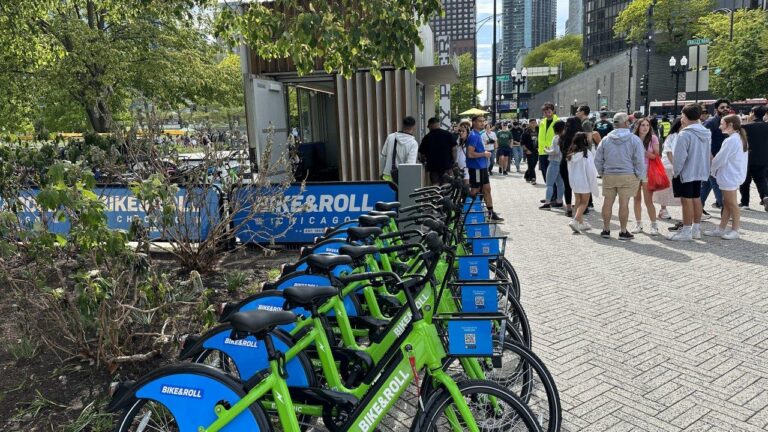Examining the Link Between Rental E-Scooters and Crime in Chicago
Analyzing Crime Patterns Associated with Rental E-Scooters in Chicago
Recent investigations into Chicago’s urban landscape have uncovered a meaningful association between the surge in rental electric scooters and a rise in certain criminal activities, especially in densely populated neighborhoods. While e-scooters are praised for their convenience and environmental benefits, law enforcement agencies have observed that their widespread availability has inadvertently facilitated crimes such as theft, property damage, and minor assaults.This trend has led to increased police presence in areas with heavy scooter usage to curb these offenses.
Notable crime categories connected to rental e-scooters include:
- Unauthorized scooter theft and usage
- Deliberate damage to scooters and surrounding property
- Disorderly behavior involving scooter riders
| Crime Category | 2019 Incidents | 2023 Incidents |
|---|---|---|
| Scooter Theft | 45 | 210 |
| Vandalism | 30 | 95 |
| Assault-Related | 10 | 28 |
In response, city officials and scooter operators are working together to enhance security protocols, including improved GPS tracking and rider education initiatives. Although shared electric scooters remain a promising sustainable transportation option, Chicago faces the challenge of ensuring these benefits do not come at the expense of public safety.
Community Safety Concerns and Public Attitudes Toward E-Scooters
As the introduction of rental e-scooters, Chicago residents have expressed a range of opinions about their impact on neighborhood safety.Supporters highlight the environmental advantages and ease of use, yet growing apprehension exists regarding unintended negative effects. Law enforcement has linked a portion of petty crimes, such as minor thefts and vandalism, to the increased availability of these vehicles. Local merchants have also raised alarms about scooters being exploited as fast escape tools, complicating surveillance efforts in busy commercial districts.
Factors shaping public opinion include:
- Observations of riders engaging in hazardous or illegal conduct
- Frequent reports of scooters left obstructing sidewalks and public spaces
- Associations between scooter rentals and minor criminal incidents despite overall positive usage data
| Community Issue | Severity |
|---|---|
| Theft linked to scooter use | Moderate |
| Obstruction of public walkways | High |
| Vandalism occurrences | Low to Moderate |
To mitigate these concerns, authorities have increased patrols in vulnerable zones and are advancing tracking technologies. Officials emphasize that maintaining a balance between innovation and vigilance is crucial to preserving the safety and utility of rental e-scooters in Chicago’s urban fabric.
Law Enforcement Tactics and Crime Prevention Efforts
In light of the rising incidents involving rental e-scooters, Chicago’s police departments have ramped up their efforts to monitor and prevent scooter-related crimes. Targeted patrols focus on neighborhoods with high scooter traffic, aiming to deter theft, assaults, and other offenses linked to these devices. Utilizing crime data analytics, law enforcement can strategically allocate resources during peak times and in hotspot locations.
Implemented enforcement strategies include:
- Strengthened partnerships with scooter rental companies for real-time incident reporting and rapid intervention
- Utilization of surveillance cameras and GPS data to track stolen scooters and identify perpetrators
- Community outreach campaigns promoting responsible scooter use and legal compliance
- Harsher penalties for crimes involving e-scooters, either as tools or targets
| Strategy | Description | Anticipated Outcome |
|---|---|---|
| Focused Patrols | Increased police visibility in high-risk areas | Reduction in opportunistic crimes |
| Data-Driven Deployment | Crime and usage data guide officer placement | More effective crime deterrence |
| Collaboration with Operators | Access to scooter locations and incident data | Quicker suspect identification and recovery |
| Public Education | Informing community about safe and lawful scooter use | Fewer accidents and violations |
Strategic Policy Proposals for Managing Rental E-Scooter Risks
To effectively tackle the challenges posed by rental e-scooters, city leaders and private companies must implement extensive policies. Recommended measures include:
- Advanced geofencing systems to prevent scooter operation in crime-prone or sensitive zones.
- Compulsory GPS tracking and data sharing with law enforcement to facilitate prompt investigations.
- Robust user verification protocols to hold riders accountable and discourage misuse.
- Routine maintenance and safety inspections to ensure scooters are not exploited for criminal purposes, such as quick escapes or as weapons.
Moreover, fostering collaboration among scooter providers, police, and urban planners can enhance safety without compromising convenience. Below is a comparison of policy options currently being evaluated across various cities:
| Policy | Objective | Projected Effect |
|---|---|---|
| Geofencing | Restrict scooter zones | Lower incidence of scooter-related crimes |
| User Identification | Enhance rider accountability | Decrease in theft and vandalism |
| Data Sharing | Strengthen police collaboration | Accelerated crime resolution |
| Safety Inspections | Ensure scooter reliability | Reduced misuse risks |
Final Thoughts: Balancing Innovation and Safety in Chicago’s Micromobility Landscape
As Chicago continues to evolve its urban transportation ecosystem, the emerging evidence linking rental e-scooters to certain criminal activities adds complexity to the dialog.While these electric scooters provide an efficient and environmentally friendly travel option, it is indeed imperative that stakeholders address the accompanying safety and security challenges. Sustained cooperation among municipal authorities, law enforcement, and scooter operators will be vital to harmonizing technological innovation with community well-being, ensuring that micromobility solutions contribute positively to Chicago’s future.





